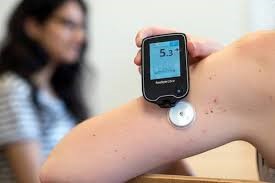On-demand: featuring presentation and speaker Q&A: sponsored by Abbott, this webinar has been developed to support and upskill diabetes professionals with everything they need to know about the second generation of Flash Glucose Monitoring.
Please note, this event is designed for use by NHS Healthcare Professionals only. If you would like to access this webinar, please email bookings@sbk-healthcare.co.uk and we will send you the link to view.
A full list of all upcoming Diabetes events can also be viewed at the official Diabetes National Networking Forum website.


Useful techniques
This dedicated webinar will enable you to support your patients on the second generation of Flash Glucose Monitoring:
Support and guidance for you in your own time
Assess and determine the accuracy of the second generation of Flash Glucose Monitoring plus benefit from:

| 1 hour video | Filmed on Friday 12th March 2021 | featuring: | |
|
Introduction
Iain Cranston, Consultant Physician (Diabetes & Endocrinology), Portsmouth Hospitals NHS Trust
|
|
|
HCP guide to second generation of Flash Glucose Monitoring
Emma Wilmot, Consultant Diabetologist, University Hospitals of Derby and Burton NHS Foundation Trust
|
|
|
Question and answer session
Emma Wilmot and Iain Cranston will be answering the questions and comments that came into the chat box during their presentation, engaging with the thoughts and feelings of the NHS professionals who attended this webinar live.
|
|

Everything you need to know...
Dr Wilmot is a Consultant Diabetologist at Derby Teaching Hospitals. Her specialist interests include Type 1 diabetes, insulin pump therapy and diabetes technology, young adults with diabetes and antenatal diabetes care. Dr Wilmot is chair of the ABCD Diabetes Technology Network UK. In this role she leads the delivery of a programme of educational events for multidisciplinary diabetes teams. She is a member of the National Diabetes Audit Insulin Pump Expert Reference Group and has been heavily involved in the development of the 2018 national Type 1 diabetes service level audit. She has also led the development of a suite of national ‘best practice’ guides related to insulin pump therapy. Dr Wilmot has been involved in the #language matters movement which aims to improve healthcare professional communication with people with diabetes. Dr Wilmot was awarded the University of Leicester medal for excellent PhD performance in 2013 for her PhD “Type 2 diabetes in younger adults”. The output from her PhD has attracted both national and international media interest, in addition to a number of prizes and publications.
Dr. Iain Cranston is a diabetes physician based
in Portsmouth, UK. He has specialty responsibility for the delivery of
technology‐driven services (CSII / CGM etc.) to approximately 1% of the
UK population. Alongside this, he is the lead diabetes clinician for the
Wessex renal and transplant centre, managing individuals with specific
and high glycaemic risks.
He has a background in clinical
research, obtained during his time at Guy’s and King’s College and St
Thomas’ Hospitals, into impaired awareness of hypoglycaemia in
insulin‐treated diabetes and the cerebral and endocrine mechanisms
underlying the syndrome. For the last 20 years, Dr Cranston has been in
practice with the goal of translating the lessons learnt from research
into routine clinical care consultations. This has resulted in a focus
on effective glucose monitoring strategies to underpin clinical
decision‐making and the development of data analytical processes to
guide clinical consultations towards more effective therapeutic
interventions in both type 1 and type 2 diabetes. He has published
widely on this topic area (over 60 Peer‐reviewed publications) and has
been an invited speaker at Diabetes UK, EASD and many National meetings
around the world.
For the last 4 years, Dr Cranston has been a
co‐director in a collaborative educational project with Professor Roger
Mazze (International Diabetes Center [IDC] Minnesota), at the AGP
Clinical Academy, which has the central goal of educating healthcare
professionals in the effective clinical interpretation of the ambulatory
glucose profile derived from continuous glucose monitoring technologies